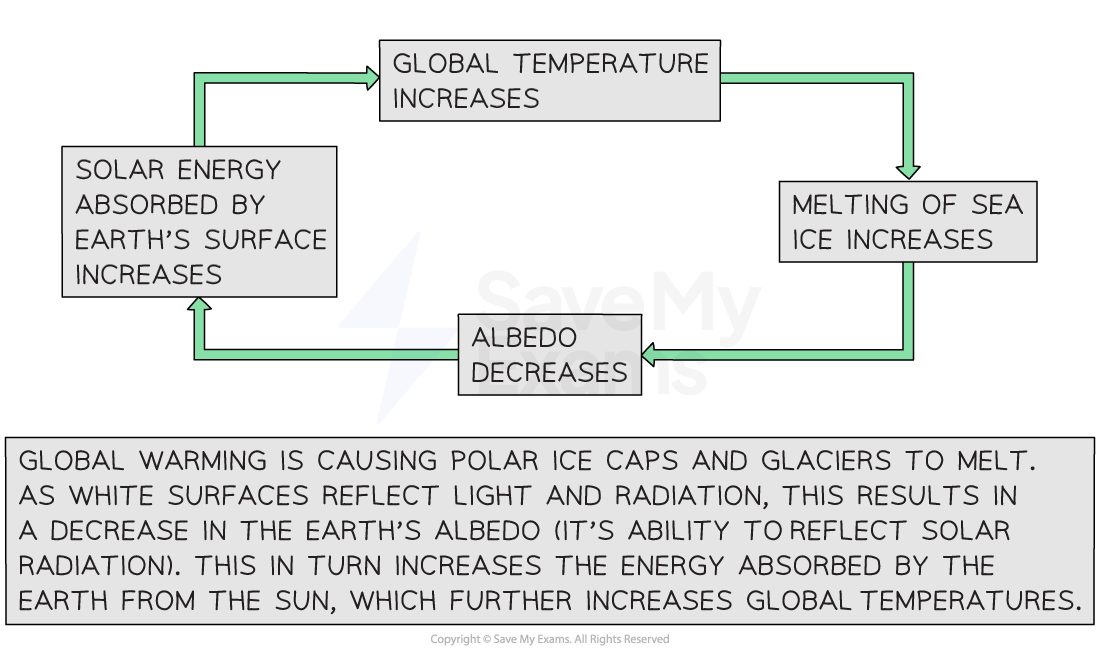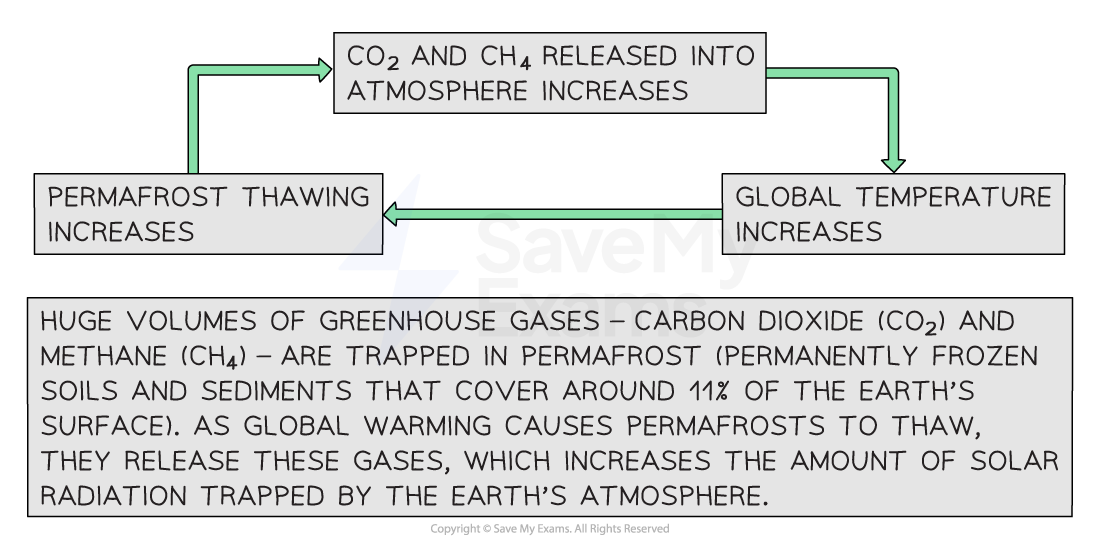Causes of Climate Change (DP IB Biology): Revision Note
Climate Change: Anthropogenic Causes
The greenhouse effect
When radiation from the sun hits the earth, it is radiated back from the earth's surface
A greenhouse gas is a gas that absorbs this re-radiated radiation, trapping it in the earth's atmosphere so that it is not lost to space
Greenhouse gases in the atmosphere have a similar effect to the glass in a greenhouse, hence the term greenhouse gas, and their effect being known as the greenhouse effect
The greenhouse effect is important to ensure that Earth is warm enough for life; if it were not for the insulating effect of greenhouse gases, Earth would see similar dramatic temperature fluctuations to its neighbouring planets
Temperatures on Mars range between 20°C and −153°C
There are many greenhouse gases including
Carbon dioxide
Methane
It is thought that increasing levels of carbon dioxide and methane are entering the atmosphere as a result of human activities, leading to increased rates of atmospheric warming
The atmospheric warming, and therefore the changing climate, for which humans are thought to be responsible is known as anthropogenic climate change
Greenhouse effect diagram

Greenhouse gases absorb radiation re-emitted from the earth's surface, trapping it in the atmosphere
Human activities & carbon dioxide
Atmospheric carbon dioxide levels have fluctuated throughout Earth's history due to events such as volcanic eruptions and the weathering of limestone rocks
Since the industrial revolution, however, atmospheric carbon dioxide levels have risen to their highest in Earth's history
The industrial revolution began in the late 1700s when the combustion of fossil fuels to power factories, transport, and homes became commonplace
Fossil fuel combustion releases carbon dioxide
A clear correlation can be seen between increasing levels of carbon dioxide since the industrial revolution and increasing global temperatures, providing evidence for the role of human activities in causing global warming
Note that a correlation alone is not enough to prove causation, but this evidence can be taken alongside what we know about greenhouse gases and other evidence to provide a growing body of proof
In addition to the burning of fossil fuels, carbon dioxide is also released into the atmosphere when natural stores of carbon are damaged or destroyed by human activities
These carbon stores are known as carbon sinks
Carbon sinks include trees, soils, peat bogs, and the oceans
Deforestation, soil degradation, peat harvesting, and ocean warming all contribute to the addition of carbon dioxide to the atmosphere
Human activities & methane
Methane (CH4) is a simple hydrocarbon
It is present as a gas in the atmosphere, and underground, and is the main component of natural gas fossil fuel
Methane can be produced by naturally occurring processes in some types of bacteria, but levels have risen significantly in the last 150 years due to human activities
Methane can be produced by several human activities
Methane is released from the guts of ruminant mammals, such as cattle, that are farmed by humans
The intensive farming of such animals has greatly increased their contribution to atmospheric methane
Landfill sites release methane when organic matter such as food waste decomposes
Extraction of fossil fuels from underground releases methane
Anaerobic bacteria in waterlogged rice paddy fields release methane
In addition to the list above, the warming of the poles that results from global warming also leads to the release of methane from natural stores such as permafrost
Permafrost is ground that remains frozen all year round
Atmospheric carbon dioxide and methane concentration graph

Atmospheric concentrations of both carbon dioxide and methane have increased since the industrial revolution due to human activities. ppm = parts per million and ppb = parts per billion.
NOS: Students should be able to distinguish between positive and negative correlation and should also distinguish between correlation and causation
Correlation analysis involves measuring two variables and assessing the relationship between the variables to look for an association
A relationship that shows correlation can show
Positive correlation - as one variable increases, the other variable also increases
Negative correlation - as one variable increases the other variable decreases
In climate change research, evidence from Antarctic ice cores shows a positive correlation between global temperatures and atmospheric carbon dioxide over hundreds of thousands of years
Global temperatures and atmospheric carbon dioxide correlation graph

Evidence from Antarctic ice cores shows a positive correlation between global temperatures and atmospheric carbon dioxide over hundreds of thousands of years
While a correlation shows evidence of association, in itself it does not provide evidence of causation, i.e. that a change in one variable has caused a change in the other
It is not possible to say which variable has influenced the other
It is possible that an unknown third variable might be involved
Note that in the case of carbon dioxide concentrations and global temperatures, there is additional evidence to support a causal link
Examiner Tips and Tricks
Note that the greenhouse effect, global warming and climate change are terms that are often used interchangeably, but the terms have different meanings:
Global warming refers to the rise in global temperatures mainly due to the increasing concentrations of greenhouse gases in the atmosphere
Climate change refers to the increasing changes in the measures of climate over a long period of time – including precipitation, temperature, and wind patterns. These are often a consequence of global warming
The greenhouse effect is a naturally occurring event, constantly occurring due to the atmosphere and sunlight
Global Warming: Positive Feedback Cycles
Positive feedback is any mechanism in a system that leads to additional and increased change away from the equilibrium
Positive feedback loops occur when the output of a process feeds back into the system in a way that moves the system increasingly away from the average state
In this way, positive feedback is destabilising; it amplifies deviation from the equilibrium and drives systems towards a tipping point where the state of the system suddenly shifts to a new equilibrium
Positive feedback and global warming
Global warming has a positive feedback effect on the earth and its atmosphere
This means that global warming leads to more global warming, which further increases global warming, etc.
There are several factors that contribute to the positive feedback cycle of global warming
Loss of reflective snow and ice
The extent to which a surface reflects light is known as its albedo; the higher the albedo, the more light is reflected
Light coloured surfaces such as snow and ice have a high albedo, while dark surfaces such as rock and soil have a low albedo
As the polar ice caps melt due to global warming, the earth's overall albedo decreases, and more of the sun's energy is absorbed by exposed rock, soil, and the dark surface of the oceans; this increases global warming
This cycle continues, further increasing global warming
Impact of melting ice flow diagram

The loss of polar ice contributes to the positive feedback cycle of global warming
Accelerating decomposition
Decomposition is carried out by living organisms such as bacteria and fungi
These organisms break down dead matter and waste in a series of enzyme-controlled reactions
The enzyme-controlled reactions of decomposition occur faster at higher temperatures, meaning that as global warming increases, rates of decomposition increase
The respiration of decay microorganisms releases carbon dioxide into the atmosphere
Increased decomposition in peat bogs releases huge volumes of carbon dioxide
Peat bogs function as carbon sinks when they are stable
Increased decomposition in permafrost releases carbon dioxide
In parts of the world where temperatures remain low all through the year, the ground remains frozen for most of the year; this frozen ground is permafrost
Permafrost is a huge carbon sink because it contains organic material that cannot decompose at low temperatures
Decay organisms are inactive at low temperatures
Increased atmospheric carbon dioxide further contributes to the greenhouse effect, increasing global warming
Release of methane
Melting permafrost can also lead to the release of methane (CH4), a potent greenhouse gas
This is due to the activity of methanogenic microorganisms in the frozen soil, which increases as permafrost melts
Methanogenic microorganisms are species of archaea that produce methane as part of their metabolism
Impact of melting permafrost flow diagram

Melting permafrost leads to the release of carbon dioxide and methane, further increasing global warming
Increasing drought and forest fires
As global warming increases the frequency of extreme weather events, droughts occur more often
The dry vegetation that results from drought can catch fire easily, and wild fires become more likely
Combustion of plant material releases carbon dioxide into the atmosphere, where it increases global warming
The resulting reduction in the number of photosynthesising plants means that less carbon dioxide is removed from the atmosphere

Unlock more, it's free!
Was this revision note helpful?
